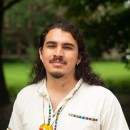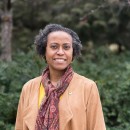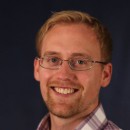COVID-19 News
 Nicolás Juárez Named a Robert Wood Johnson Foundation Health Policy Research Scholar
Nicolás Juárez Named a Robert Wood Johnson Foundation Health Policy Research ScholarPhD student Nicolás Juárez was named to the 2023 cohort of the Robert Wood Johnson Foundation’s Health Policy Research Scholars. The national leadership program is for full-time doctoral students who are entering their second year of study and are from populations underrepresented in specific doctoral disciplines and/or historically marginalized backgrounds.
“I am so excited to be part of the 2023 Health Policy Research Scholars cohort,” said Juarez. “I know another world is possible, and I am incredibly grateful to be given the time and resources to craft socially just and participatory approaches to environmental degradation and injustice.”
- October 3, 2023
- Learn more »
- Curtis Center Supports CDC on Addressing COVID-19 Health Inequities
The Vivian A. and James L. Curtis School of Social Work Center for Health Equity Research and Training Center has secured a contract with the National Network of Public Health Institutes to review best or promising practices that address social and structural determinants of health related to COVID-19.
The Curtis Center was one of just four research centers contracted to support more than 100 grant recipients from the CDC in the assessment, translation and dissemination of evidence-based practices — and best or promising — practices to address COVID-19 related disparities associated with at-risk and underserved populations, including racial/ethnic minorities and rural communities.
- January 17, 2022
 Trina Shanks’ Editorial in Detroit Free Press Encourages Home Ownership in Detroit
Trina Shanks’ Editorial in Detroit Free Press Encourages Home Ownership in DetroitThe conventional mortgage market is not working in Detroit, writes Professor Trina Shanks in a Detroit Free Press editorial. Shanks and her co-authors recommend new programs to support homebuyer education programs and establish a single-family residential rehabilitation fund. “We know the private mortgage market does not serve Detroit in the same way as it does adjacent communities. The evidence is indisputable,” writes Shanks. The article cites data reviewed by the Center for Equitable Family and Community Well-Being that shows that vast swath of Detroit, identified by neighborhood, see very little mortgage lending activity in relation to residential property sales. “We are in a once in a lifetime moment, where substantive federal investments are flowing into Detroit. Let's focus these infrastructure investments in a way that benefits Detroiters.
- January 17, 2022
- Learn more »
- PhD Student Charles Williams II Encourages Vaccination in Michigan HHS Video
PhD student Charles Williams II is featured in a video from the Michigan Department of Health and Human Services addressing vaccine hesitancy and encouraging the COVID-19 vaccination. Williams, who is pastor of the Historic King Solomon Baptist Church, says “There is no invincibility to COVID-19. If it hits you, and it hits you wrong, you’re gone.”
- September 13, 2021
- Watch the video »
- Historic King Solomon Baptist Church: Responding to a Community in Crisis
Read the ENGAGE team’s case study on Charles E. Williams II, PhD student and pastor at the Historic King Solomon Baptist Church. During the early days of the pandemic, Williams and his congregation spearheaded efforts to coordinate food delivery and other assistance to vulnerable Detroit area residents. At the height of the response effort, 30 Black churches were mobilized to deliver 700,000 meals across the city of Detroit — allowing vulnerable residents to stay at home and help curb the spread of COVID-19. Williams’ work exemplifies the power of connecting communities to resources, and how Michigan Social Work supports movements for social change, especially during times of crises.
- May 10, 2021
- Learn more »
- Graduate and Professional Students Weekly COVID-19 Testing
Required Weekly COVID-19 Testing
All students – including graduate and professional students – who live on or come to campus will be required to be tested weekly through the U-M Community Sampling and Tracking Program starting February 16. Currently, over 10% of all COVID reports of students are graduate students.
Weekly testing will be required for all SSW students (including those who have received the vaccine) who:
- Live in Michigan housing.
- Are registered for any in-person courses that meet on campus, regardless of how frequently the course meets in-person.
- Are employed or have in-person field placement on campus (including Michigan Medicine).
- Conduct research in a campus facility/building.
- Come to campus to use facilities (e.g. libraries, unions, Rec Sports, SSW building).
Field
Listed below is testing information for field:
- If your field placement is on campus and in-person, you will be required to participate in the weekly testing program.
- If your field placement is not on campus, you only need to test if it is a requirement of the field agency/site. You can participate in the U-M testing program.
- If you are uncomfortable with testing protocols related to field education, please contact your field faculty about options.
- If your field placement is entirely off campus AND you do not come to campus for any reason, you are not required to be tested weekly. You are eligible, though, to voluntarily sign up for periodic testing on campus.
If You Have Tested Positive for COVID-19
If you have previously tested positive for COVID-19, you are excluded from testing for a 90-day period from the date of your test. If you were tested by the U-M Community Sampling and Tracking Program, University Health Service or Occupational Health Services, your result will automatically be captured. If you were tested elsewhere, please submit your positive results.
- February 5, 2021
- Learn more »
- County and U-M Partner on Stay in Place Directive to address COVID-19
Washtenaw County Health Department in partnership with the University of Michigan issued a public health emergency “Stay in Place” directive for University of Michigan undergraduate, graduate and professional students enrolled in winter 2021 effective immediately and ending on February 7, 2021 at 11:59 PM.
- January 28, 2021
- Learn more »
- Center for Equitable Family & Community Well-Being Lead Ypsilanti COVID-19 Study
Researchers at the Center for Equitable Family & Community Well-Being surveyed more than 600 low-income residents across Ypsilanti about the impact of COVID-19. Their work is giving voice to the needs of those disproportionately impacted by the pandemic, ensuring that local health and economic responses attend to issues of equity.
The Ypsilanti COVID-19 Study is a collaboration between Eastern Michigan University’s Family Empowerment Program, the Washtenaw County Racial Equity Office, and the Center for Equitable Family & Community Well-Being within the U-M School of Social Work.- January 20, 2021

 Vaccine Distribution Requires That Medical Establishment Reckon With Institutional Racism
Vaccine Distribution Requires That Medical Establishment Reckon With Institutional RacismProfessor Trina Shanks and Patrick Meehan, Program Manager of the Center for Equitable Family and Community Well-Being, wrote an op-ed for the Michigan Journal of Public Affairs. They write: “As the rollout of COVID-19 vaccines begins, the medical establishment faces a critical challenge: earning Black Americans' trust.”
- January 13, 2021
- Learn more »
- PhD Student Charles Williams II Addresses African Americans Distrust of Vaccine
PhD Student Charles Williams II spoke with the Detroit Free Press about the skepticism in Black communities about the COVID-19 vaccination. As a clergy member who interacts with patients in hospital settings and in his church, Williams qualified to get an early vaccine. He hopes to convince his church members that the vaccine is safe. “As a leader, as a pastor… if I have to be the one to get my arm poked so folks can feel a little bit comfortable about them doing it, so be it,” said the Rev. Charles Williams II, current PhD student.
- January 11, 2021
- Learn more »